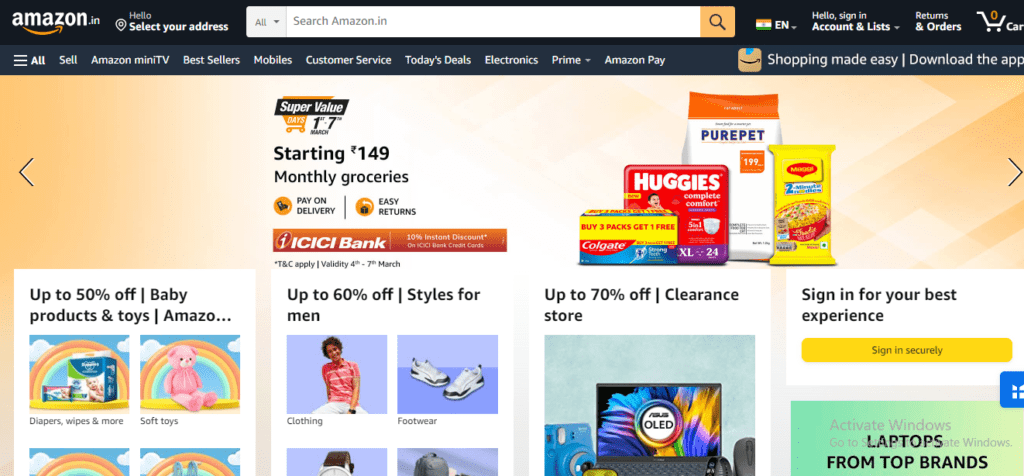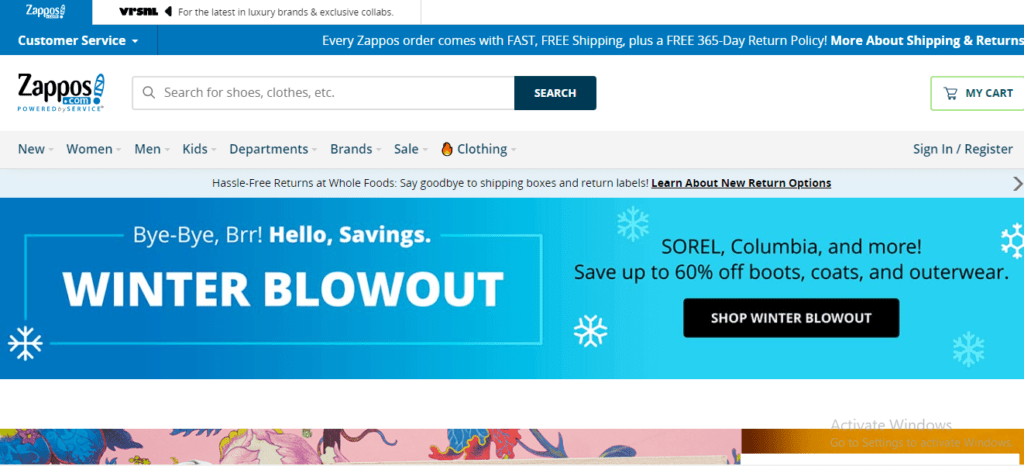The Best Products to Sell in B2C E Commerce Are
A) Specialty products
B) Fresh products
C) Small products
D) Digital products
Correct Answer is D) Digital products
Explanation:
There is no single answer to this question as it depends on various factors such as the target audience, market trends, and competition. However, here are some popular products that tend to perform well in B2C e-commerce:
- Electronics: This includes smartphones, laptops, tablets, gaming consoles, smartwatches, and other gadgets.
- Fashion and accessories: Clothing, shoes, bags, jewelry, and other fashion accessories are always in demand.
- Health and beauty products: Skincare, makeup, hair care, supplements, and other wellness products are a popular choice among consumers.
- Home and kitchen appliances: This includes appliances such as refrigerators, microwaves, air conditioners, and kitchen equipment such as blenders, mixers, and coffee makers.
- Toys and games: This category includes video games, board games, puzzles, and educational toys.
- Sports and outdoor equipment: Products such as bicycles, camping gear, sports equipment, and fitness gear are popular among consumers who enjoy outdoor activities.
- Pet supplies: This includes food, toys, grooming products, and other pet-related items.
It’s important to note that these are just general categories, and it’s important to research and analyze the market to determine the best products to sell in a particular niche.
What is Meant by E Commerce
E-commerce, short for electronic commerce, is the process of buying and selling products and services online. It involves conducting business through the internet, including activities such as online shopping, electronic payments, and online banking.
E-commerce enables businesses to reach customers around the world, and it has transformed the way people shop and conduct transactions. It has eliminated geographical boundaries and time constraints, making it possible for consumers to purchase products from anywhere and at any time.
There are several types of e-commerce models, including business-to-business (B2B), business-to-consumer (B2C), consumer-to-consumer (C2C), and consumer-to-business (C2B). Each model involves different types of transactions and relationships between the parties involved.
Overall, e-commerce has become an integral part of modern business, and it continues to grow and evolve as new technologies and trends emerge.
Types of Ecommerce Businesses
There are several types of ecommerce businesses, each with its own unique characteristics and target market. Here are the most common types:
- Business-to-Consumer (B2C) Ecommerce: This is the most common type of ecommerce business, where businesses sell their products or services directly to individual consumers. Examples include online retailers such as Amazon and Zappos.
- Business-to-Business (B2B) Ecommerce: This involves businesses selling products or services to other businesses. Examples include software as a service (SaaS) providers such as Salesforce and Hubspot.
- Consumer-to-Consumer (C2C) Ecommerce: This type of ecommerce business involves consumers selling products or services to other consumers through online marketplaces. Examples include eBay and Etsy.
- Consumer-to-Business (C2B) Ecommerce: This type of ecommerce business involves individual consumers selling their products or services to businesses. Examples include freelance marketplaces such as Upwork and Fiverr.
- Mobile Commerce (M-Commerce): This involves buying and selling products or services through mobile devices, such as smartphones and tablets.
- Social Commerce: This involves buying and selling products or services through social media platforms, such as Facebook and Instagram.
- Subscription Ecommerce: This involves businesses selling products or services on a recurring basis, such as monthly subscription boxes or software subscriptions.
- Dropshipping: This is a type of ecommerce business where businesses don’t hold inventory, but instead work with suppliers who ship products directly to customers.
Overall, ecommerce businesses can take many forms, and the type of business chosen will depend on factors such as the target market, product or service offering, and business goals.
B2C Ecommerce Example
A B2C ecommerce business is one that sells products or services directly to individual consumers. Here are some examples of B2C ecommerce businesses:
Amazon: Amazon is the world’s largest online retailer and offers a wide range of products, including books, electronics, clothing, and groceries, to consumers.

Zappos: Zappos is an online shoe and clothing retailer that offers free shipping and returns to customers in the United States.

Sephora: Sephora is a beauty retailer that offers makeup, skincare, and fragrance products to consumers both online and in stores.
Warby Parker: Warby Parker is an eyewear company that sells prescription glasses, sunglasses, and contact lenses to consumers online and in stores.
HelloFresh: HelloFresh is a meal delivery service that provides customers with pre-portioned ingredients and recipes to cook at home.

These are just a few examples of B2C ecommerce businesses, but there are many others out there, ranging from small businesses to large corporations. The common thread among all B2C ecommerce businesses is that they sell products or services directly to individual consumers through online platforms.
E Commerce Working Model
The working model of an e-commerce business can vary depending on the type of business and its specific goals and processes. However, here are some general steps involved in the e-commerce working model:
- Product Sourcing: E-commerce businesses need to source products from suppliers or manufacturers. This can involve negotiating prices, ordering products, and managing inventory.
- Website Development: Businesses need to develop an online platform, such as a website or mobile app, that allows customers to browse and purchase products.
- Product Listing: Products need to be listed on the e-commerce platform, including product descriptions, images, and pricing.
- Payment Processing: E-commerce businesses need to provide secure payment processing for customers, which can include credit card processing, PayPal, or other online payment options.
- Order Fulfillment: Once an order is placed, businesses need to fulfill the order by packaging and shipping the product to the customer.
- Customer Service: E-commerce businesses need to provide customer service, including responding to inquiries, handling returns and refunds, and addressing customer complaints.
- Marketing and Advertising: E-commerce businesses need to market and advertise their products through various channels, such as social media, email marketing, and search engine optimization, to attract new customers and retain existing ones.
Overall, the e-commerce working model involves a combination of business operations, technology, and customer service to create a seamless online shopping experience for customers.
Example of B2B ECommerce in India
There are several B2B ecommerce businesses in India, serving a wide range of industries and businesses. Here are some examples of B2B ecommerce businesses in India:
- IndiaMART: IndiaMART is India’s largest online B2B marketplace, connecting buyers and suppliers across various industries, such as industrial machinery, electronics, and chemicals.
- Tolexo: Tolexo is an online platform that provides a range of industrial and office supplies, such as safety equipment, power tools, and office furniture, to businesses across India.
- Moglix: Moglix is a B2B ecommerce platform that specializes in providing industrial supplies and equipment, such as power tools, safety gear, and electricals, to businesses across India.
- Udaan: Udaan is a B2B ecommerce platform that offers a range of products, including electronics, fashion, and home appliances, to retailers and small businesses across India.
- Bizongo: Bizongo is a B2B platform that provides packaging solutions, such as boxes, bags, and containers, to businesses across various industries, such as food and beverage, healthcare, and e-commerce.
These are just a few examples of B2B ecommerce businesses in India, but there are many others out there, ranging from small startups to large corporations. The common thread among all B2B ecommerce businesses is that they provide a platform for businesses to source products and services from suppliers in a convenient and efficient manner.
How can B2C ecommerce benefit you over a traditional store?
B2C ecommerce can offer several benefits over traditional brick-and-mortar stores, including:
- Convenience: With B2C ecommerce, customers can shop from anywhere and at any time, without having to physically visit a store. This can save time and effort for customers, who can browse and purchase products online from the comfort of their own home.
- Wider Reach: B2C ecommerce can allow businesses to reach a wider audience, including customers who may be located in different cities, states, or even countries. This can enable businesses to expand their customer base and increase sales.
- Lower Overhead Costs: B2C ecommerce can be more cost-effective than traditional stores, as it eliminates the need for physical retail space, staff, and other overhead costs associated with operating a physical store.
- Personalization: B2C ecommerce can offer personalized shopping experiences for customers, with features such as recommended products, personalized product suggestions, and targeted marketing campaigns.
- 24/7 Availability: B2C ecommerce can offer businesses the ability to operate 24/7, with no restrictions on opening or closing times. This can enable businesses to cater to customers who prefer to shop outside of regular business hours.
Overall, B2C ecommerce can offer a range of benefits over traditional stores, including convenience, wider reach, lower costs, personalization, and 24/7 availability.
Top E-commerce Products For B2C Companies to Sell in 2023
However, some of the best-selling e-commerce products for B2C companies in recent years include:
- Consumer electronics: Products such as smartphones, laptops, and smart home devices continue to be popular among online shoppers.
- Apparel and accessories: Clothing, shoes, and accessories are some of the top-selling products in the e-commerce industry, with many consumers preferring to shop for fashion online.
- Beauty and personal care: Cosmetics, skincare, and personal care products have seen a surge in demand in recent years, with many consumers turning to e-commerce sites for their beauty needs.
- Home and kitchen appliances: Home and kitchen appliances, such as refrigerators, washing machines, and ovens, are also popular among online shoppers, particularly those looking for high-end or luxury products.
- Health and wellness: Products such as vitamins, supplements, and fitness equipment have seen a rise in demand as consumers become more health-conscious and prioritize self-care.
These are just a few examples of popular e-commerce products for B2C companies, and the market trends and preferences can vary depending on the specific industry and target audience. It is always important for businesses to conduct market research and stay updated on consumer behavior and preferences to determine the best products to sell.
Conclusion
In conclusion, the products listed above are some of the best products to sell in B2C e-commerce. Electronics, apparel and accessories, beauty and personal care, home and kitchen appliances, and health and wellness products are highly popular among consumers and can be highly profitable for businesses. These products have a large customer base, high profit margin, large sales volume, and a high repeat purchase rate, making them an attractive option for businesses looking to sell in B2C e-commerce. As the e-commerce industry continues to grow, businesses that sell these products are likely to see continued success in the coming years.
FAQ:
Q: Why are electronics considered one of the best products to sell in B2C e-commerce?
A: Electronics are highly popular among consumers, with many preferring to purchase them online. Additionally, electronics often come with a high profit margin, making them an attractive option for businesses.
Q: What makes apparel and accessories a good choice for B2C e-commerce?
A: Apparel and accessories are popular among younger consumers, who are more likely to purchase these products online. Additionally, these products often come with a high markup, making them profitable for businesses.
Q: Why are beauty and personal care products a top-selling category in B2C e-commerce?
A: Beauty and personal care products have seen a significant increase in demand in recent years, with many consumers turning to e-commerce sites for their beauty needs. These products often come with a high markup and can be sold in large quantities.
Q: What makes home and kitchen appliances a profitable category in B2C e-commerce?
A: Home and kitchen appliances can be expensive to purchase, and many consumers prefer to shop for them online, where they can compare prices and features across multiple retailers. Additionally, these products often come with a high profit margin.
Q: Why are health and wellness products a good choice for B2C e-commerce?
A: Health and wellness products have seen a rise in demand as consumers become more health-conscious and prioritize self-care. These products can be particularly popular among younger consumers, who are more likely to purchase them online.
Q: Are there any other categories of products that are profitable in B2C e-commerce?
A: Yes, there are several other categories of products that can be profitable in B2C e-commerce, including pet products, toys and games, and home decor.
Q: What are some key factors to consider when choosing products to sell in B2C e-commerce?
A: When choosing products to sell in B2C e-commerce, it’s important to consider factors such as the size of the customer base, profit margin, sales volume, repeat purchase rate, and shipping convenience. It’s also important to stay up-to-date on industry trends and consumer preferences to ensure that you are selling products that are in high demand.
